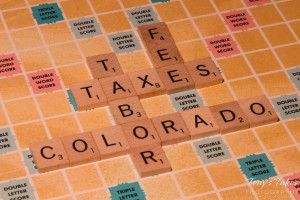|
Effort underway to address Colorado’s ‘fiscal thicket,’ undo voter referendums
DENVER – There’s a veritable graveyard in Colorado of failed constitutional reform movements.
Blue ribbon panels, legislative committees, summits and countless academic studies have been mulled up over the years to address the fact that Colorado voters have frequently and easily petitioned and changed the state constitution.
But a new group – Building a Better Colorado – is launching a 30-stop listening tour across the state to find out what Coloradans want to do about the growing constitutional conundrum.
Not everything is on the table, but just about.
The group is backed by Colorado businessman Dan Ritchie, who has led two Colorado universities and the Denver Center for the Performing Arts. He’s attracted 16 political co-chairs split evenly between Republicans and Democrats. The first of the meetings (what organizers called a dress rehearsal) kicked off this weekend in Grand Junction at the Club 20 meeting.
“It’s unlike anything that has been done before,” said Curtis Hubbard, a spokesman for the group with Onsight Public Affairs. “We want to go out, talk to Coloradans, present them with the challenges as we see them and then figure out if we can come up with solutions.” Continue reading
Fight brewing over TABOR among the issues
Club 20 pitches ideas to Western Slope conservatives during event
Fight brewing over TABOR among the issues
GRAND JUNCTION — Some of the Western Slope’s most influential and most conservative local leaders heard an unspecific plan to change the way Coloradans vote on political candidates, put constitutional amendments on the ballot and pay taxes at Club 20’s fall conclave this weekend.
A new bipartisan, nonprofit civic organization called Building a Better Colorado is crafting its pitch to Colorado voters, who might vote on some of these changes during next year’s general election.
Looming budget crises and potentially unsustainable cuts in state services are driving civic and political leaders to look for remedies, supporters told Club 20 members Saturday morning.
To read the rest of this article, click the following link:
http://www.denverpost.com/news/ci_28802309/club-20-pitches-ideas-western-slope-conservatives-during-event
Are business license fees a tax subject to TABOR? Denver District Judge will decide
Denver District Court Judge Bruce Jones will decide if the money collected from business owners is a fee or a tax, an answer that “will affect policy for years to come,” said Tony Gagliardi, Denver director of the National Federation of Independent Business.
The Colorado Secretary of State’s office since 1983 has collected fees from businesses and used the money to pay for all of the activities run by the office, including elections. The funding structure of the office, which is unique in the state, was set up long before the first utterance of Colorado’s Taxpayer’s Bill of Rights, which was voter-approved in 1992 and says voters get to decide on new taxes and tax increases.
NFIB, on behalf of its members, filed a lawsuit in 2014 against Colorado Secretary of State Scott Gessler. The office is now held by Wayne Williams, who was in court Friday for a hearing where Judge Jones heard arguments of the fee/tax issue.
At the heart of NFIB’s argument is that fees, which are not subject to TABOR, are intended to defray the costs of a particular government service like processing business licenses. A tax is designed to raise revenues to defray the general expense of government.
The Secretary of State’s office collects about $20 million a year in fees from businesses that are filing required forms, but only about 11 percent of that is needed to oversee the business-licensing program. The rest of the money pays for elections, bingo and raffle regulation and other functions that aren’t related to business, said Jason Dunn, attorney with Brownstein Hyatt Farber Schreck who represents NFIB.
Judge Jones put it this way: “At what point did you wake up and realize this was not a fee?” directing his questions to Dunn. “What was the clarion call?” Continue reading
Never Forget….
Happy Labor Day Weekend!
Private Industry vs Big Government…
CSU study finds 80 percent of Colorado taxpayers pay more because of TABOR
The Taxpayer’s Bill of Rights was supposed to keep money in people’s pockets, but 80 percent of Coloradans actually pay more in taxes to supplement their local schools, according to a study released Tuesday by the Colorado Futures Center at Colorado State University.
“Since the early 1990s, Colorado has enacted layers of reform in pursuit of two conflicting goals – lower property taxes and well-funded public schools,” said Phyllis Resnick, lead economist at the center and lead author of a paper the research for the nonpartisan Lincoln Institute of Land Policy, “Measuring the Impact of Tax and Expenditure Limits on Public School Finance in Colorado.”The Lincoln Institute is a private think tank that studies land taxes and use.
“The result is greater inequality and inconsistency, and surprisingly, a greater tax burden for most Coloradans.”
To read the rest of this article, click the following link:
http://blogs.denverpost.com/thespot/2015/09/01/csu-study-finds-80-percent-of-colorado-taxpayers-pay-more-because-of-tabor/122792/
Carroll: Averting a Colorado budget smashup
Why don’t we save the esteemed Dan Ritchie and his bipartisan group of civic-minded bigwigs a lot of time and trouble?
The former chancellor at the University of Denver and his allies who’ve founded Building a Better Colorado are going to spend months in meetings and outreach trying to identify measures for next year’s ballot to address the unique challenges in governing this state.
They’ve got former governors, senators and mayors on board, not to mention current Gov. John Hickenlooper.
To read the rest of this article, click the following link:
http://www.denverpost.com/carroll/ci_28720814/carroll-averting-colorado-budget-smashup
Blake: Sabotaging TABOR comes down to a single subject
Blake: Sabotaging TABOR comes down to a single subject
When it comes to sabotaging TABOR, term limits and the initiative process, the usual suspects tend to round themselves up.
The latest group, called “Building a Better Colorado,” is fronted by the otherwise estimable Dan Ritchie, who served 15 years as chancellor of the University of Denver, taking no pay and donating his $50 million ranch to the school.
The organization intends to hold “town hall meetings” throughout the state and produce a report recommending changes by year’s end.
Presumably most of these changes would necessitate ballot initiatives, since it’s hard to get the two-thirds majorities needed in the legislature to place referendums.
By proposing initiatives they are going to have to confront the awkward single-subject rule. More on that later.
Despite the clarity of their goals, the reformers like to talk in tiptoe-through-the-tulips terms. “It is subtle,” Gail Klapper of the Colorado Forum told The Denver Post, adding the discussions are about “nuanced changes” allowing Colorado “to move forward in the way we all want it to go.”
The Colorado Forum is just one of several civic groups behind Ritchie’s efforts. Its goals aren’t that subtle. It says on its Web site that “Colorado’s fiscal system has a structural imbalance — created by inherently conflicting constitutional mandates — that will continue to result in a widening gap between General Fund revenue and necessary expenditures.”
However “necessary” might be defined. The Forum goes on to recommend that TABOR-mandated refunds to the people be postponed and “revenue sources” not subject to the revenue cap be considered. Presumably that means imposing more “fees” instead of taxes that require a popular vote.






